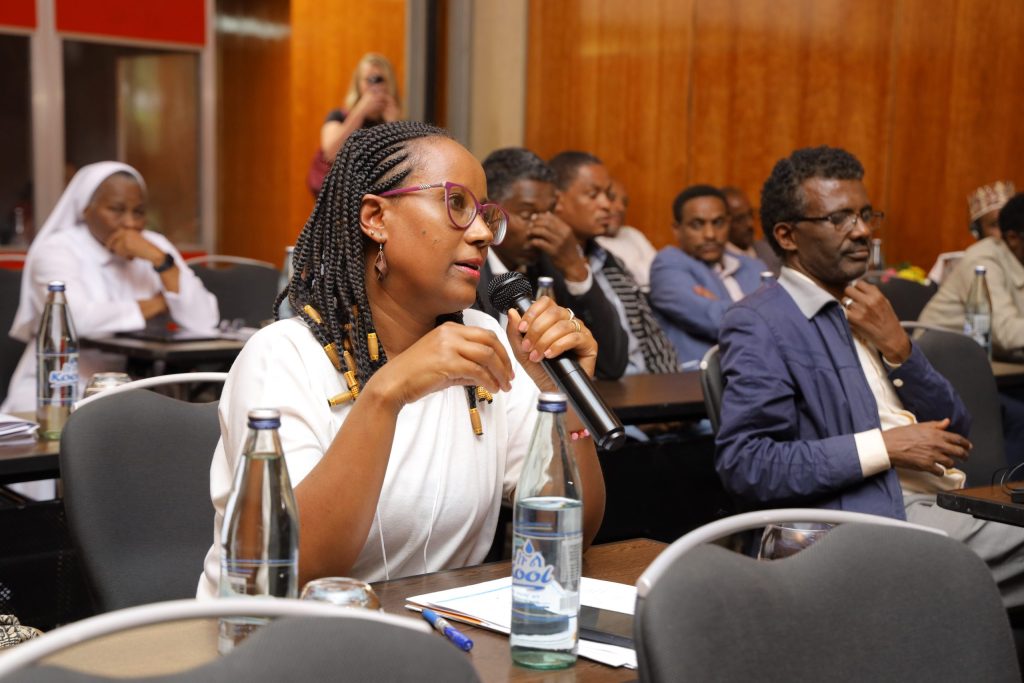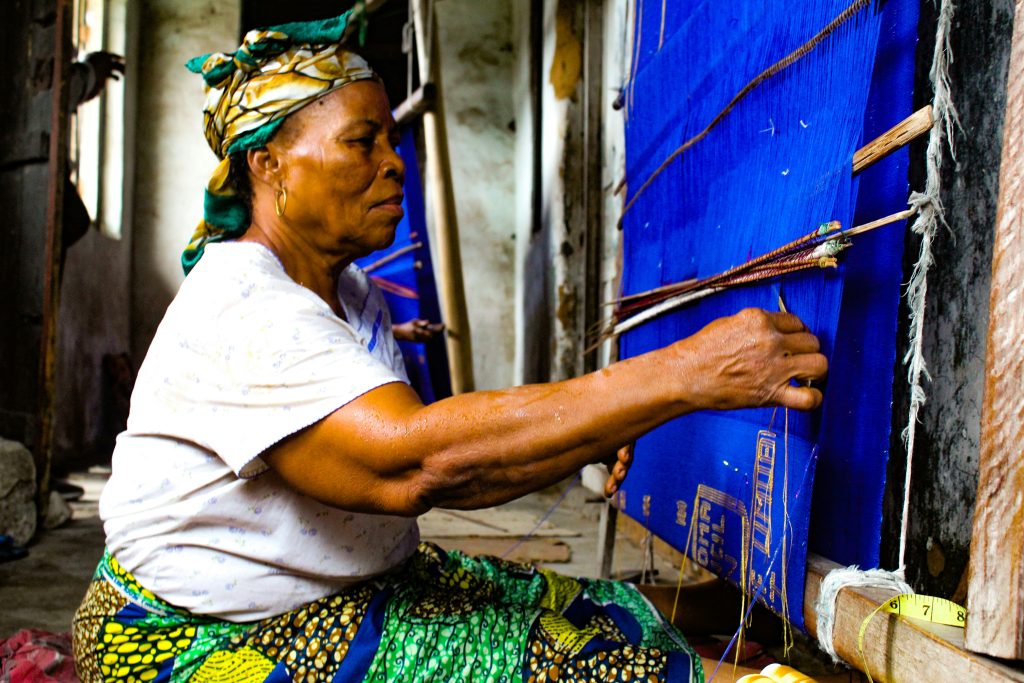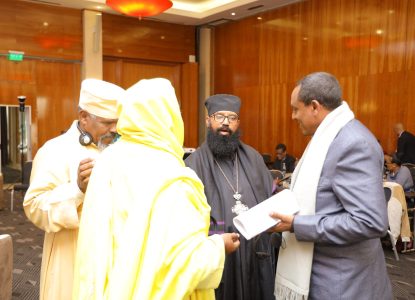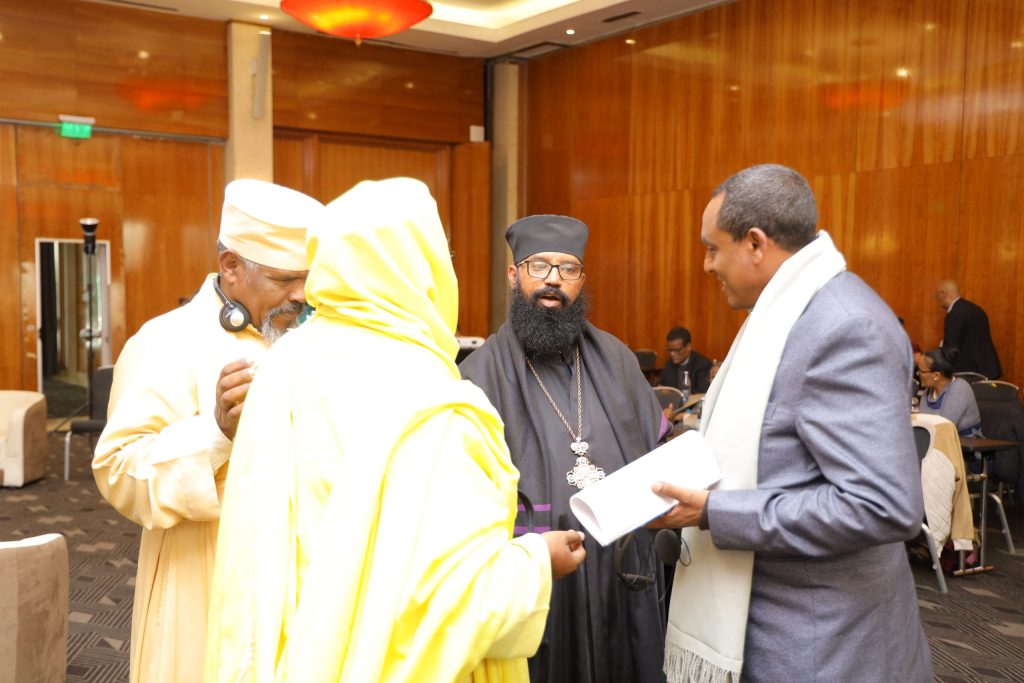On May 13-14, 2025, the G20 Interfaith Forum Association, in partnership with the United Religions Initiative (URI), the Inter-Religious Council of Ethiopia, and the African Union, hosted a two-day conference on “Africa’s Faith Communities: Advancing the Sustainable Development Goals, the African Union Agenda 2063, and G20 South Africa’s 2025 Process.” A key focus of the gathering was exploring how Africa’s diverse faith communities can meaningfully contribute to and influence G20 priorities, particularly as South Africa prepares to host the G20 presidency. The discussions highlighted the unique position of faith-based organizations as trusted community anchors that often provide essential services where government infrastructure is limited, while examining their potential to shape global policy through initiatives like the G20 Interfaith Forum. This emphasis recognizes that achieving sustainable development and peace requires the active participation of religious leaders and faith-inspired organizations as partners in addressing the continent’s most pressing challenges.
The following summary was compiled based on notes taken by Marianna Richardson throughout the conference proceedings. This represents the fourth and final of four topic-based summaries capturing the key insights and discussions from this landmark interfaith gathering.
G20 Interfaith Forum: Africa’s Vital Role in Global Dialogue and Development
Rodrigo Vitorino Souza Alves, Chair of the Local Organizing Committee for the G20 Interfaith Forum Brazil 2024, emphasized the significance of Africa’s contributions to the G20 Interfaith process. Speaking during World Interfaith Harmony Week, he highlighted how interfaith and religious communities play a crucial role in advancing the Sustainable Development Goals, the African Union’s Agenda 2063, and the G20’s broader objectives.
With Brazil holding the 2024 G20 presidency, Alves outlined its priorities—social inclusion, energy transition, and governance reform—emphasizing the G20’s responsibility in addressing global challenges. He detailed how interfaith actors in Brazil worked alongside policymakers, culminating in a major success: the adoption of a recommendation on combating human trafficking and modern slavery.
Alves underscored the unique position of African and Latin American voices in shaping global priorities. He praised the contributions from Africa, particularly through the Ubuntu-centered efforts in South Africa, calling them essential to building a just, inclusive, and sustainable world.
The Vital Role of Faith-Inspired Organizations in Global and Local Affairs
Professor Maniraj Sukdaven, Co-Chair of South Africa’s Local Organizing Committee for the G20 Interfaith Forum and a professor at the University of Pretoria, emphasized the indispensable role of faith-inspired organizations in shaping both global and national development agendas. As moderator of the session, he reflected on key messages from the South African President, who highlighted the importance of human flourishing, resilience, and the essential contributions of religious leaders in promoting peace and prosperity.
Prof. Sukdaven also referenced Pope Francis’s urgent call to care for the environment and address the suffering of the marginalized, urging faith communities to take a leading role in fostering a better future. He introduced the panelists, noting their role in addressing how faith organizations can influence policy and development at multiple levels, particularly in preparation for South Africa hosting the G20 Interfaith Forum.
Faith, Justice, and Development: SECAM’s Role in Africa’s Future
Rev. Dr. Stephen Okello, AU Liaison Officer of the Symposium of Episcopal Conferences of Africa and Madagascar (SECAM) emphasized the importance of 2025 as a pivotal year for Africa. Marking the 60th anniversary of Vatican II and the “Gaudium et Spes” constitution, this year calls for addressing historical injustices and building respectful reparations. SECAM, representing the Catholic Church across Africa, has actively contributed to social cohesion, inclusive development, and grassroots mobilization on health, education, and livelihood projects. The organization advocates for ethical governance and environmental responsibility, aligning with the African Union’s Agenda 2063 and the UN Sustainable Development Goals.
Despite ongoing economic growth, Africa still faces deep challenges—conflict, displacement, and debt—exacerbated by foreign interests, often linked to G20 nations. Dr. Okello called for equitable development, fair resource valuation, and Africa’s stronger voice in global forums. He urged South Africa to use its G20 presidency to champion the continent’s priorities effectively.

The Transformative Power of Faith in Peacebuilding: Insights from Sister Agatha O. Chikelue
Sister Agatha O. Chikelue, Executive Director of the Cardinal Onaiyekan Foundation for Peace and Chair of Religions for Peace-International Women’s Coordinating Committee, emphasized the critical role of faith communities in fostering peace, justice, and sustainable development across Africa. She described peace not simply as the absence of violence, but as the presence of justice, dignity, and shared values.
She highlighted the Cardinal Onaiyekan Foundation for Peace Fellowship Program (CFP) as a visionary initiative that equips grassroots faith leaders—especially women and youth—with skills in mediation, leadership, and conflict transformation. Over the course of a year, fellows receive intensive training and implement community-based peace projects addressing challenges such as trauma recovery, radicalization, and interfaith tensions. The CFP fosters a growing network of peacebuilders across the continent.
Sister Agatha concluded by affirming that peace is a daily choice and that faith, when empowered with the right tools, can be a powerful force for healing and change.
Reflections from Dr. Gorden Simango
Dr. Gorden Simango, from the All Africa Conference of Churches’ African Union Office and Advocacy, highlighted the critical role that faith-based organizations (FBOs) play in Africa’s health, education, and peacebuilding sectors. Speaking in the context of the 2025 G20 Summit in South Africa, he underscored the importance of solidarity, equity, and sustainability, noting that faith communities are deeply embedded in African societies and often operate where government institutions cannot reach.
Dr. Simango emphasized the substantial contribution of FBOs in healthcare, with statistics showing that faith-based institutions provide between 40% to 70% of health services in countries like Nigeria, Malawi, Uganda, and Tanzania. He stressed the need to recognize FBOs as key stakeholders in sustainable development and conflict resolution. These organizations frequently serve as first responders during crises and are trusted mediators in community-level disputes, capable of engaging in pre-conflict and post-conflict mediation.
He also called attention to the often-overlooked role of FBOs in Track 2 diplomacy, helping communities voice their concerns to decision-makers and influencing policy from the grassroots level. Dr. Simango advocated for the importance of insider mediation, where religious actors intervene before conflict erupts, addressing root causes like hate speech and societal polarization.
Concluding his remarks, he urged faith communities to embrace their responsibility not just as moral compasses, but as proactive agents of peace and development. He emphasized the African proverb “Africa is my home, Africa is my future,” calling for unity and cooperation across borders to address the continent’s pressing challenges.
Building Peace Through Faith and Compassion: Remarks by Elder K. Thierry Mutombo
Elder K. Thierry Mutombo of The Church of Jesus Christ of Latter-day Saints, President of Africa West Area, delivered a heartfelt address underscoring the essential role of faith communities in promoting peace and humanitarian upliftment across Africa. He began by thanking the Ethiopian government and other represented nations for supporting religious freedom and allowing people to worship according to their conscience.
Elder Mutombo emphasized that religious leaders are not elected by the people but divinely appointed to serve as instruments of peace, moral guidance, and community resilience. He reiterated the words of his Church’s global president, Russell M. Nelson, who teaches that love and compassion must transcend differences—we do not have to look alike or think alike to love one another. True peace and progress, he stated, begin with individuals choosing kindness and goodwill, one person at a time. He quoted both President Nelson and the Church’s founding prophet, Joseph Smith, to highlight that anger and contention never produce meaningful solutions, and that love is a defining trait of godliness.
Collaboration Across Borders and Religions
Elder Mutombo affirmed that religion transcends national boundaries and that interfaith collaboration is already making a positive difference across the continent. He praised the many faith-inspired organizations working for peace, social cohesion, and development, noting that this forum offers a chance to deepen cooperation for greater good.
The Church of Jesus Christ of Latter-day Saints, he explained, has had a presence in Africa since 1853, with increased focus in the last 40 years. It actively partners with interreligious councils across Ethiopia, Uganda, Burundi, and the Democratic Republic of the Congo to address key issues including:
- Humanitarian relief
- Conflict resolution
- Strengthening families and marriages
- Promoting peace and reconciliation
In closing, Elder Mutombo issued a powerful reminder of shared moral responsibility. As people of faith, he said, we are called to care for the poor, the broken, the hungry, the imprisoned, the orphaned, and the widowed, while working collectively to build peace and justice. He affirmed the Church’s unwavering commitment to walk hand-in-hand with all who seek to bless Africa and its people. “May God bless us all,” he concluded, leaving listeners with a renewed sense of purpose and unity.

Moral Leadership for Human Flourishing: Address by Dr. Francis Kuria, Secretary General, Religions for Peace – Africa
Dr. Francis Kuria, Secretary General of Religions for Peace Africa, delivered a powerful speech highlighting the important role of Africa’s diverse religious communities in promoting peace, justice, and sustainable development. He emphasized the unity and diversity of faith traditions across the continent, including African traditional religions, Muslim communities, various Christian denominations, and other spiritual groups. According to Dr. Kuria, these faith communities share a common vision centered on dignity, peace, sustainable development, and human flourishing.
He pointed out that faith actors have historically been involved in humanitarian and development work long before governments and international organizations stepped in. Their deep connection with local communities grants them a unique moral authority and ability to build trust, particularly in regions affected by conflict or instability. Dr. Kuria stressed the importance of recognizing faith communities as active partners in implementing global development and peace agendas, such as the Sustainable Development Goals and Africa-focused G20 priorities. He framed this involvement as a moral responsibility rooted in the religious values of compassion, justice, and solidarity.
Dr. Kuria also acknowledged Ethiopia as a symbol of spiritual richness and resilience, noting its significance as a host for the summit. He urged participants to draw on Africa’s collective spiritual heritage to heal divisions, rebuild social trust, and anchor development efforts in African values and beliefs.
In closing, Dr. Kuria called for peace and development efforts to be deeply rooted in Africa’s faith traditions and to involve religious actors fully. He stressed that such inclusive, faith-based collaboration is essential for achieving lasting transformation on the continent. His vision emphasized cross-faith and cross-border cooperation aimed at healing wounds, promoting justice, fostering solidarity, and ensuring inclusive progress toward a peaceful and flourishing Africa.
The Role of Faith Communities in Advancing Peace, Unity, and Sustainable Development in Africa: Address by Mohamed Bahr
Mohamed Bahr, Head of Strategic Planning at the Muslim Council of Elders, emphasized the critical role faith communities play in addressing Africa’s complex challenges, including global conflicts, environmental crises, and social inequalities. He highlighted that faith communities are trusted institutions capable of driving transformative change by promoting peace, unity, and healing. Bahr stressed the importance of religious freedom, noting that societies respecting this principle tend to attract economic growth and foreign investment.
He spoke about the Council’s longstanding commitment to peace, dialogue, coexistence, truth, and conflict resolution, referencing a multi-year project that worked to integrate Muslim communities into broader society through education and mediation in various African regions. Bahr described faith-based peaceful dialogue as essential to fostering justice and not merely the absence of conflict.
Additionally, he noted the Council’s role in amplifying the voices of faith communities on global platforms and their focus on research, citing a successful initiative that engaged hundreds of organizations, many from Africa. Bahr concluded with a call to action for greater collaboration among faith-based organizations and other institutions to work together in addressing Africa’s urgent needs, emphasizing that faith communities serve as moral authorities and first responders in the continent’s pursuit of peace and development.



